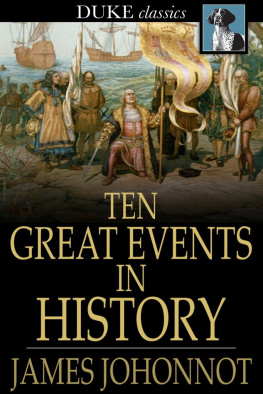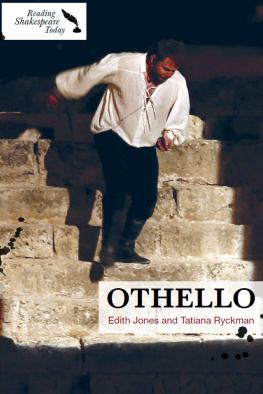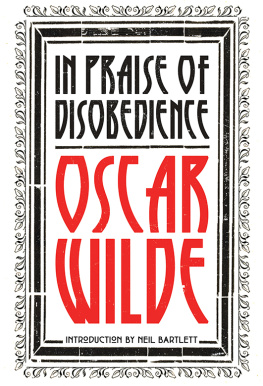TEN GREAT EVENTS IN HISTORY
* * *
JAMES JOHONNOT
*
Ten Great Events in History
From an 1887 edition
ISBN 978-1-62011-527-5
Duke Classics
2012 Duke Classics and its licensors. All rights reserved.
While every effort has been used to ensure the accuracy and reliability of the information contained in this edition, Duke Classics does not assume liability or responsibility for any errors or omissions in this book. Duke Classics does not accept responsibility for loss suffered as a result of reliance upon the accuracy or currency of information contained in this book.
Contents
*
Preface
*
Patriotism, or love of country, is one of the tests of nobility ofcharacter. No great man ever lived that was not a patriot in thehighest and truest sense. From the earliest times, the sentiment ofpatriotism has been aroused in the hearts of men by the narrative ofheroic deeds inspired by love of country and love of liberty. Thistruth furnishes the key to the arrangement and method of the presentwork. The ten epochs treated are those that have been potential inshaping subsequent events; and when men have struck blows for humanliberty against odds and regardless of personal consequences. Thesimple narrative carries its own morals, and the most profitable workfor the teacher will be to merely supplement the narrative so that thepicture presented shall be all the more vivid. Moral reflections arewearisome and superfluous.
Chapter I - Defense of Freedom by Greek Valor
*
The great events in history are those where, upon specialoccasions, a man or a people have made a stand against tyranny, andhave preserved or advanced freedom for the people. Sometimes tyrannyhas taken the form of the oppression of the many by the few in thesame nation, and sometimes it has been the oppression of a weak nationby a stronger one. The successful revolt against tyranny, the terribleconflict resulting in the emancipation of a people, has always beenthe favorite theme of the historian, marking as it does a step in theprogress of mankind from a savage to a civilized state.
One of the earliest as well as most notable of these conflicts ofwhich we have an authentic account took place in Greece twenty-fourhundred years ago, or five hundred years before the Christian era. Atthat time nearly all of Europe was inhabited by rude barbarous tribes.In all that broad land the arts and sciences which denote civilizationhad made their appearance only in the small and apparentlyinsignificant peninsula of Greece, lying on the extreme southeastborder adjoining Asia.
At a period before authentic history begins, it is probable thatroving tribes of shepherds from the north took possession of the hillsand valleys of Greece. Shut off on the north by mountain ranges, andon all other sides surrounded by the sea, these tribes were able tomaintain a sturdy independence for many hundred years. The numerousharbors and bays which subdivide Greece invited to a maritime life,and at a very early time, the descendants of the original shepherdsbecame skillful navigators and courageous adventurers.
The voyages of Aeneas and Ulysses in the siege of Troy, and thoseof Jason in search of the golden fleece, and of Perseus to the courtof King Minos, are the mythological accounts, embellished byimagination and distorted by time, of what were real voyages. Crossingthe Mediterranean, Grecian adventurers became acquainted with theEgyptians, then the most civilized people of the world; and from Egyptthey took back to their native country the germs of the arts andsciences which afterward made Greece so famous.
Thence improvements went forward with rapid strides. Hints receivedfrom Egypt were reproduced in higher forms. Massive temples becamelight and airy, rude sculpture became beautiful by conforming tonatural forms, and hieroglyphics developed into the letters whichCadmus invented or improved. Schools were established, athletic sportswere encouraged, aesthetic taste was developed, until in the arts, inphilosophy, in science, and in literature the Greeks took the lead ofall peoples.
As population increased, colonies went out, settling upon theadjacent coasts of Asia and upon the islands farther west. In Asia theGreek colonists were subject to the Persian Empire, which thenextended its rule over all Western Asia, and claimed dominion overAfrica and Eastern Europe. The Greeks, fresh from the freedom of theirnative land, could not patiently endure the extortions of the Persiangovernment, to which their own people submitted without question;hence conflicts arose which finally culminated in Persia takingcomplete possession of the Asiatic Greek cities.
But the ties of kinship were strong, and the people of Greecekeenly resented the tyranny which had been exercised over theircountrymen, and an irrepressible conflict arose between the twonations. The Persian king, Darius, determined to put an end to allannoyance by invading and subjugating Greece. Before the final marchof his army, Darius sent heralds throughout Greece demanding soil andwater as an acknowledgment of the supremacy of Persia, but Herodotussays that at Sparta, when this impudent demand was made, the heraldswere thrown into wells and told to help themselves to all the earthand water they liked.
After a long preparation, in 490 B.C., an army of one hundredthousand men or more, under the command of Artaphernes, convoyed by aformidable fleet, invaded Greece. For a long time it met with littleopposition, and city after city submitted to the overwhelming hosts ofthe Persian king. The approach to Athens was regarded as the finalturning point of the war.
Artaphernes selected the Plains of Marathon, twenty-two miles tothe northeast of Athens, as the place of his final landing. Hisforces, by the lowest estimate, consisted of one hundred and fiftythousand men, of which ten thousand were cavalry. To these wereopposed the army of Athens and its allies, consisting in all of tenthousand men. The battle-ground forms an irregular crescent, six mileslong and two broad in its widest part. It is bounded on one side bythe sea, and on the other by a rampart of mountains. At the time ofthe battle the extremities of the plain were flanked by swamps,diminishing the extent of the front, and hampering the operations ofthe larger army. The command of the Greek army had been intrusted toten generals, who ruled successively one day each. Themistocles, oneof these generals, resigned his day in favor of Miltiades, and all theothers followed his example. And so the battle was set, ten thousandGreeks, under Miltiades, against the overwhelming hosts of the enemy.
The Persians, confident in their numbers, erected nointrenchments. They did not dream of an attack from the little band ofGreeks. There is evidence to believe that they were dissatisfied withthe nature of the battle-field they had chosen, and were upon thepoint of embarking to land at some point nearer the city. If this wasthe case, they were very rudely awakened from their dream of securityby the movement of the Greeks.
On the morning of the tenth day after leaving Athens, Miltiadesdrew up his army in order of battle. He was obliged to perilouslyweaken his center in order to confront the whole of the Persian army,so as to avoid the danger of being outflanked and surrounded. TheGreeks began the battle by a furious attack along the whole line,endeavoring to close in a hand-to-hand conflict as soon as possible,so as to avoid the deadly arrows of the Persians, and to take theadvantage of their heavier arms. The Persians were greatly astonishedwhen they saw this little band rushing against them with such aheadlong dash, and thought that the Greeks must have been seized withmadness. The Persian general had concentrated his forces at thecenter, and at this part of the battle-field the fiery onset of Greekswas checked by mere weight of numbers. But at length the mightyPersian force moved irresistibly forward, forcing the Greeks slowlybackward, fighting, dying, but never yielding. Soon the Greek armywere cut in two, and the Persians marched proudly onward to assuredvictory.














